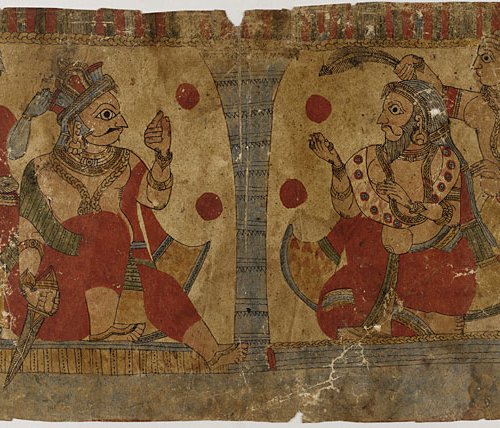Austerities: Returning to the One
 The
Indian scholar Krishna Chaitanya/KK Nair interprets the Sanskrit word yajnas as
altruistic acts. It is true that the Vedas do prescribe elaborate sacrificial
rituals, however I agree with Mr. Nair and feel that understanding the ideal of
altruism is more relevant to our own times.
The
Indian scholar Krishna Chaitanya/KK Nair interprets the Sanskrit word yajnas as
altruistic acts. It is true that the Vedas do prescribe elaborate sacrificial
rituals, however I agree with Mr. Nair and feel that understanding the ideal of
altruism is more relevant to our own times.
The concept of sacrifice begins with God sacrificing a portion of Its Being to create this universe and others. God is All. The Unmanifest creates the appearance of multiplicity and gives Its Self over to the Manifest.
God is the universe, the awesome creation, the amazing temporal illusory hologram we enjoy! When we go Home, we return to the One, the Unmanifest. We give up multiplicity. We give back the manifested ‘sacrifice’ in the form of austerities.
God is ubiquitous and everything that exists is God in the form of what is merely the appearance of Separation. God does not need anything, because God is already everything. Therefore acts of sacrifice as altruism, which are done without any expectation of reward, are considered to be Godlike and sattvic.
A sacrifice not for rewardment made,
Offered in rightful wise ...
- Ganguli XVII.11
Krishna tells Arjuna that altruistic acts (yajnas) which are performed by those who are not seeking reward are sattvic (XVII.11). The offerings which are made only for show are hypocritical (dambha) and rajasic (XVII.12). And the sacrifices which are made without faith (sraddha-virhitam) are tamasic (XVII.13).
Tapas - Austerities
In the Sanskrit texts it is often said that practicing austerities (tapas) leads to liberation (moksha). The word austerities is almost never heard in the west, except in monasteries. The Sanskrit word tapas means ‘consuming by heat’ (M.Monier-Williams).
There are many astonishing tales of beings, human and otherwise, who gain merit by performing austerities - such as standing on one toe in extremes of heat and cold for hundreds, even thousands of years. This kind of effort usually frightens the gods, especially Indra the ruler of heaven, who reacts by sending a seductive apsara (sky dancer) to distract them from surpassing him.
Krishna gives us some insight into what it means to practice austerities in more practical ways. Physical austerities (tapas) are said to be arjavam, which Abhinavagupta defines as sincerity, straightness, and simplicity (B.Marjanovic). Treating God and those who have gained real Wisdom with respect and honor is also an act of austerity, along with nonviolence (ahimsa) and celibacy (XVII.14).
Chastity implies purity
The Sanskrit word for celibacy is Brahmacharya and Abhinavagupta translates this as chastity, which conveys more the idea of purity than giving up sex. The Gambhirananda translation says that one does ‘not engage in prohibited union’.
I do not recommend that anyone give up sex before they are ready to do so. Suppressing youthful hormones can cause more trouble than good. However a moment will arrive when this marvelous, delightful, splendid act loses its allure and many who are moving further along the Path Home simply cease to want sexual partners.
When you understand how the gunas operate, you see that such close and intimate interactions with another person can cause serious confusion. The consciousness of your partner, in the form of their gunas in motion, may cloud your ability to implement your growing Wisdom of Discrimination and Discernment. In short, it is difficult enough to recognize our own patterns of attachment and those who aspire to liberation don’t want to complicate the process.
Best of all, God becomes your partner and the expression of Love between God and the Soul can never be limited to the body.
What we say - Vakyam
Austerities that pertain to speech (vakyam) are said to be words that do not hurt anyone (XVII.15). My mother used to say - ‘if you can’t say something nice, don’t say anything at all.’ The only reason people say mean things is to make themselves feel superior and bolster the current temporal small identity-self ego. Beneath the fluctuating three gunas, we are all the One.
Words that carry the frequencies of truth (satya), and that are agreeable (priya) and pleasant can be beneficial (hita) to those who hear them. Reciting the sacred texts is also an austerity of speech.
Words causing no man woe, words ever true,
Gentle and pleasing words, and those ye say
In murmured reading of a Sacred Writ, -
These make the true religiousness of Speech.
- Ganguli XVII.15
The austerities (tapas) of the mind (manasam) are that tranquility (prasada) that allows clarity, peace, and kindness. The gentle benevolence (saumyatam) that motivates us to work for the well-being of others is also considered to be an austerity of the mind by Krishna (XVII.16).
Serenity of soul, benignity,
Sway of the silent Spirit, constant stress
To sanctify the Nature, - these things make
Good rite, and true religiousness of Mind.
- Ibid.XVII.16
Silence (muni) and the control of the mind (maunam) is explained in the Gambhirananda translation. Silence is evidence that our thoughts are abiding in the eternal Self (atman). When we restrain the impulses of the three gunas by controlling the mind, we also control our speech - what we say.
The Heart is Pure
 These
austerities are in fact nothing more than moving beyond what binds our
consciousness in the temporal illusory hologram. The seductive fluctuations of
guna-maya are not the Real. The pleasures of happiness (sukha) are inevitably
followed by the pain of loss (duhkha). The One is Pure. These so-called
austerities bring us closer to a pure heart (bhava-samsuddhih).
These
austerities are in fact nothing more than moving beyond what binds our
consciousness in the temporal illusory hologram. The seductive fluctuations of
guna-maya are not the Real. The pleasures of happiness (sukha) are inevitably
followed by the pain of loss (duhkha). The One is Pure. These so-called
austerities bring us closer to a pure heart (bhava-samsuddhih).
Sattvic, rajasic & tamasic austerities
These three kinds of austerities (tapas) that relate to body, speech, and mind are practiced with supreme (paraya) faith (sraddha) by those who have understood the liberating value of non-attachment to the temporal illusory hologram.
Non-attachment does not hold the frequencies of cold-hearted disdain or thoughtless rejection. Non-attachment does lift our consciousness beyond the illusion of the ‘fruits’ of desires. Non-attachment allows us to remain in the guna sattva (sattvakam) in the face of both failure and success (XVII.17). Those who have attained the consciousness of non-attachment can work for the well-being of the world.
Such threefold faith, in highest piety
Kept, with no hope of gain, by hearts devote
Is perfect work of Sattwan, true belief.
- Ibid.XVII.17
Those who practice austerities for show, to impress others, only seeking to win adulation and respect (mana) are hypocrites (dambhena). Their consciousness is rajasic of wavering (calam), transitory and unsure (adhruvam) of itself (XVII.18).
Religion shown in act of proud display
To win good entertainment, worship, fame,
Such - say I - is of Rajas, rash and vain.
- Ibid.XVII.18
Austerities that are performed foolishly by the deluded to harm another (parasya) or to torture (padaya) themselves are said to be tamasic (XVII.19).
Religion followed by a witless will
To torture self, or come at power to hurt
Another, - 'tis of Tamas, dark and ill.
- Ibid. XVII.19
Charitable acts
 Krishna
divides acts of generosity and charity into the three qualities (gunas) to
point out the potential for hypocrisy in gift giving. Sattvic charity is given
with no thought of reward or return to those who deserve it (XVII.20).
Krishna
divides acts of generosity and charity into the three qualities (gunas) to
point out the potential for hypocrisy in gift giving. Sattvic charity is given
with no thought of reward or return to those who deserve it (XVII.20).
The gift lovingly given, when one shall say
"Now must I gladly give!" when he who takes
Can render nothing back; made in due place,
Due time, and to a meet recipient,
Is gift of Sattwan, fair and profitable.
- Ibid. XVII.20
Rajasic gifts are given grudgingly (pariklistam) only with the expectation of getting something back or to achieve results (XVII.21).
The gift selfishly given, where to receive
Is hoped again, or when some end is sought,
Or where the gift is proffered with a grudge,
This is of Rajas, stained with impulse, ill.
- Ibid.XVII.21
Charity that is bestowed on those who are unworthy (apatrebhyah) - the proverbial ‘pearls before swine’ - and charity that is given without wisdom in contempt or disdain (avajnatam) is tamasic (XVI.22).
The gift churlishly flung, at evil time,
In wrongful place, to base recipient,
Made in disdain or harsh unkindliness,
Is gift of Tamas, dark; it doth not bless!
- Ibid.XVII.22
OM TAT SAT
Krishna now explains the Sanskrit mantra Om Tat Sat (XVII.23). The syllable ‘Om’ is made up of three sounds: A - U - M. These three sacred sounds represent the triadic nature of our universe: the three worlds of heaven, the atmosphere, and earth; the three primary gods - Brahma the principle of Creation, Vishnu as the metaphysical principle that Supports and Sustains the worlds, and Shiva as the principle of Destruction (Winthrop Sargeant).
Abhinavagupta interprets Om Tat Sat by defining AUM to represent the ‘nature of Brahman (the principle, not the deity Brahma) in which the entire universe rests.’ Tat is the aspect of Brahman in the form of intense awareness (paramarsa) of ‘the unfolding waves of the universe’ (B.Marjanovic).
Tat means ‘this’ or ‘that’ - but not in any common sense (XVII.25). Tat is used to express the inexpressible That-ness of the Absolute Oneness; as in Tat Twam Asi, meaning ‘Thou art That’.
The Sanskrit word Sat means truth (satya), goodness and reality (XVII.26). Om Tat Sat is spoken before performing acts (kriyas) of austerity (tapas), worship and altruism (yajna), and charity (dana). Offerings and austerities made without faith (asraddhaya) will produce nothing either in this world or the next (XVII.28).
